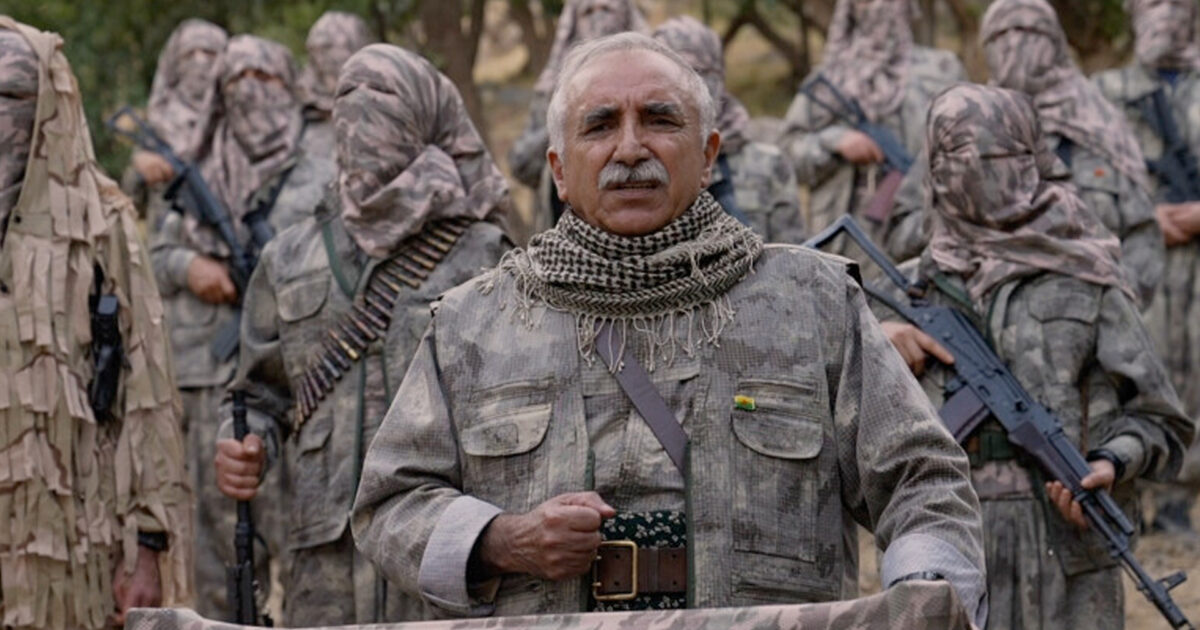PKK fighters. Image courtesy of Hezaparastin
The Kurdistan Workers’ Party (PKK) announced on October 26, 2025, that it is withdrawing all its forces from Turkey to northern Iraq, marking a major step in its peace process with Ankara. The withdrawal follows the group’s May 2025 decision to disarm and disband after its imprisoned leader, Abdullah Öcalan, called for an end to the armed struggle.
Observers estimate that between 200 and 300 fighters will take part in the withdrawal to the Qandil Mountains area of northern Iraq. This move comes after a symbolic weapons destruction ceremony held in July, which Turkish President Recep Tayyip Erdogan hailed as an “irreversible turning point.”
At the ceremony in Qandil, senior PKK leader Sabri Ok confirmed that all fighters would be relocated to Iraq and urged Turkey to enact the necessary legal reforms to safeguard the peace process. He emphasized that “specific laws, not just a general amnesty, are needed” to enable former combatants to transition into civilian and political life.
Turkey has since established a 51-member parliamentary commission tasked with drafting a legal framework for political integration and considering Öcalan’s potential release. The PKK continues to demand both his freedom and legal protections for the peace process. Turkey’s pro-Kurdish DEM Party described the withdrawal as completing the first phase of reconciliation and is expected to meet both Erdogan and Öcalan in the coming days to discuss next steps.
Analysts say the PKK’s disarmament reflects both military exhaustion and shifting public sentiment among Kurds, offering Öcalan a final chance to transform the group from an insurgency into a legitimate political movement.
The withdrawal has implications beyond Turkey. In Syria, the move was welcomed by Syrian Democratic Forces (SDF) leader Mazloum Abdi, though he clarified that his group would not disarm and that Öcalan’s call did not extend to Syria.
Analysts believe the removal of the PKK from Turkey could help de-escalate tensions with Ankara and facilitate SDF integration into the Syrian state under recent accords that call for disbanding YPG command structures and withdrawing foreign PKK cadres. Still, challenges remain as Turkey continues airstrikes in SDF-held areas, and uncertainty grows over a potential U.S. troop withdrawal from northeastern Syria.
In Iraq, PKK forces are relocating to the semi-autonomous Kurdistan Region, specifically to the Medya Defense Areas, including Mount Qandil. Turkey has long targeted PKK positions in these areas and maintains several military outposts there, often with tacit approval from the Kurdistan Regional Government (KRG). The KRG’s relationship with the PKK remains complicated, balancing opposition to an armed presence with broader Kurdish solidarity.
In an interview with The Gateway Pundit in Iraq, a Kurdish source working with both governmental and non-governmental entities described the development as “another step forward for the agreement between Turkey and the PKK toward a peaceful resolution.”
He expressed hope that future phases of the process “will be much better for the region, especially for the Kurdistan Regional Government and Rojava,” adding that the agreement would also benefit Kurds living in Turkey.
According to the source, Ankara is considering forgiving many imprisoned PKK members as part of its reconciliation efforts. He said the redeployment of PKK forces from Turkish territory to the Kurdistan Region, or Bashur, poses no threat to Iraq, emphasizing that “this is an agreement between the KRG, Turkey, and the PKK.”
Although acknowledging differences among Kurdish factions, he stressed a shared desire for peace. “In the end, they are Kurds. It doesn’t matter if we have different ideas or not. Hopefully this will bring unity and peace, and make another big step toward stability in the Middle East,” he said.
The same source added that the peace process is already having a positive impact on daily life in Iraqi Kurdistan. “Hopefully, there’s no more violence in Bashur (Southern Kurdistan, in northern Iraq). And hopefully also in Rojava it will be finished as well, no more violence,” he said.
“For example, in Kurdistan, Bashur, there are so many villagers who could not go to their area because of the violence happening there all the time. Now the door is open for them to go back to their villages, do their farming, and everybody’s happy about it.”
If the process succeeds, it could end a forty-year conflict, reduce regional instability, and set a precedent for resolving other ethnic struggles in the region. Still, major challenges remain, the fate of Öcalan, the continued existence and political participation of Kurds in Rojava, Syria, and the competing interests of Turkey, Iran, and Russia regarding Kurdish autonomy.
For now, however, the PKK withdrawal marks one of the most significant openings for peace the region has seen in decades.
Antonio Graceffo, Reporting from Iraq, Syria, and Rome, Italy.
The post PKK Withdrawal from Turkey Marks Step Toward Stability in the Middle East appeared first on The Gateway Pundit.











